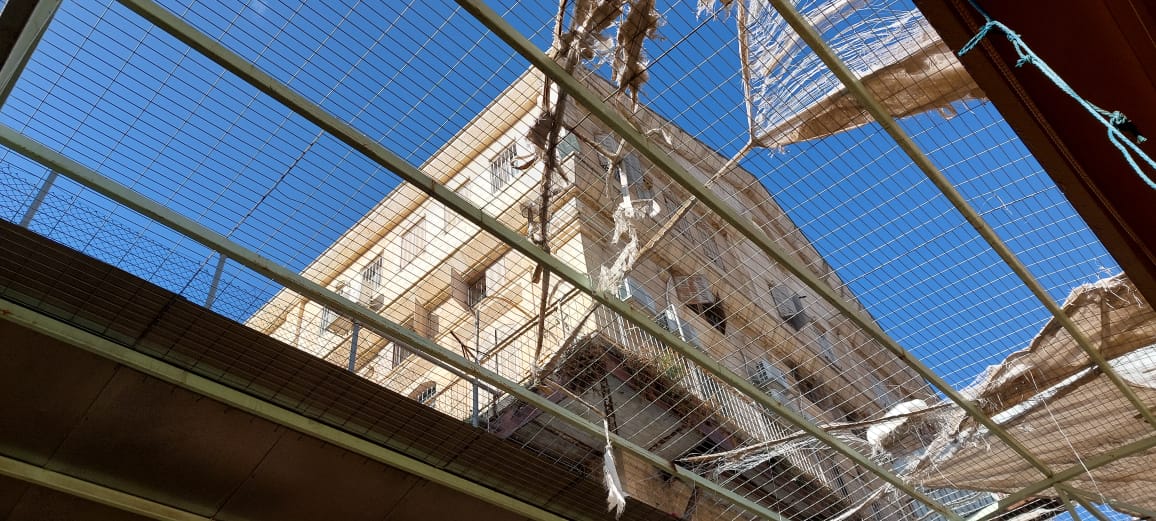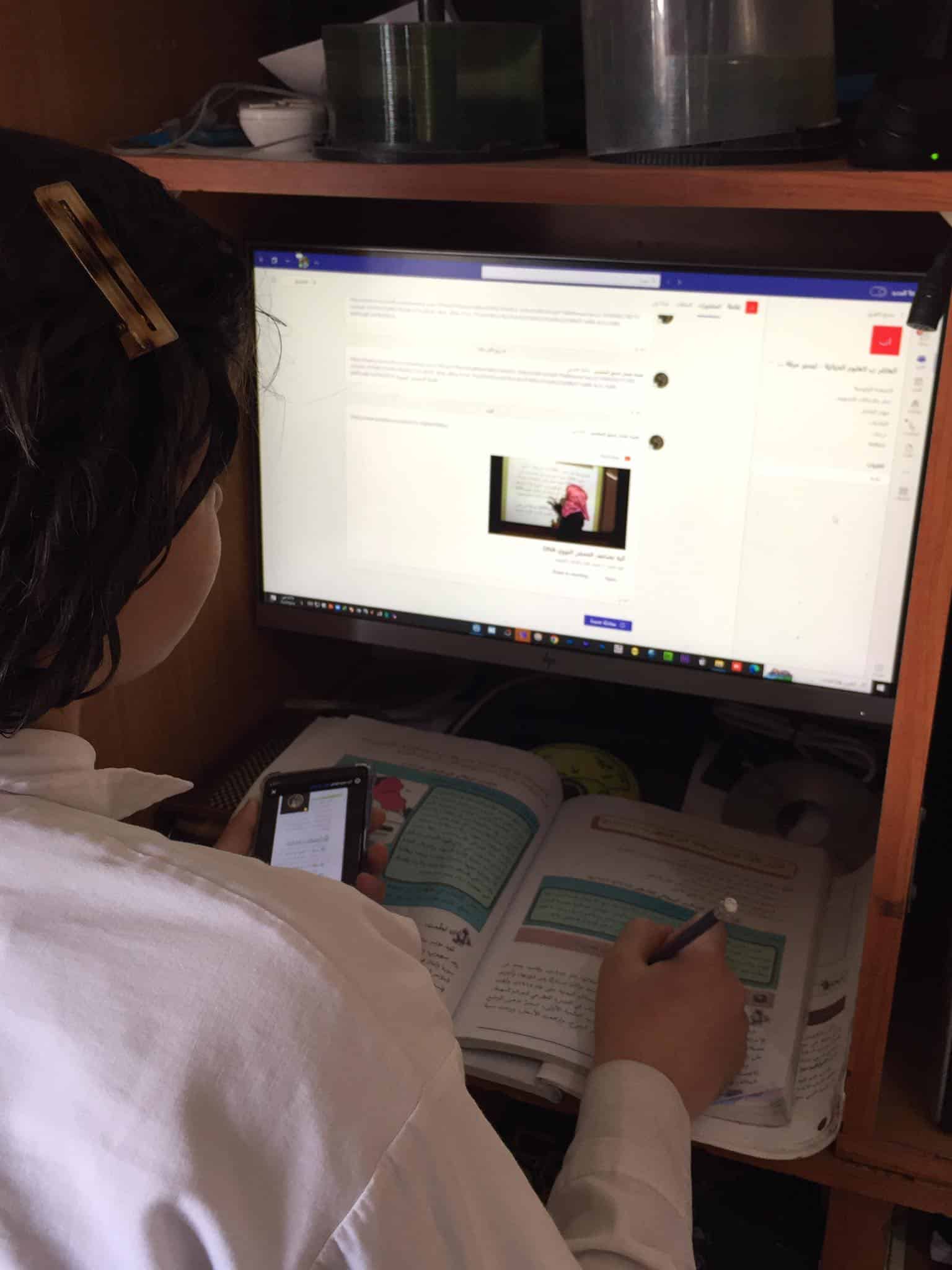‘Since the war started [Israeli soldiers] closed all the checkpoints in our area and life became totally like a prison. We are prevented from going out to go to our schools and to play around with our friends and neighbours. I miss my school and my classmates and now we are starting the mid exams, we cannot take them in school. We are feeling choked by the Israeli rules to stay home.’
Abed, aged 12, Tel Rumeida, Hebron
The lockdown placed on the West Bank since the 7 October has intensified the many restrictions that already existed in the H2 area of Hebron, where Palestinians and Israeli settlers live in close proximity. Long before the war began, movement restrictions, arrests and detentions were a threat to childhood here. Each year, up to 1000 Palestinian children, some as young as 12-years-old, are detained and prosecuted in the Israeli military court system. The most common charge is stone throwing, but some are also held without charge or trial under a system known as ‘administrative detention.’
We first visited the Sider family in April of this year. Their home is just off a busy market street in Hebron. Their courtyard, where a Palestinian flag was jauntily painted, is sealed with wiring fencing to protect them from attacks by Israeli settlers living next-door in Beit Hadassah settlement. As we walked into the courtyard, we could hear settlers with American accents through the wire fencing above. The family told us how they were harassed by their neighbours who threw down bottles and rubbish. On one occasion a few years ago, the settlers threw a highly poisonous snake. Nobody was hurt during this incident and the snake, now preserved in a jar, sits as a symbol of resilience in the family’s living room. They told us that they felt like everything was being done to push them to move away. At one point, they were given a blank cheque and told to write whatever they wanted for the home, but they refused.

Wire mesh between the Sider family and settlers home
The family now fear that their children are being deliberately targeted. Their two sons have been imprisoned in Israeli juvenile centres and their ten-year-old niece was detained by Israeli soldiers, when the neighbouring settlers accused her of wielding a knife.
When we visited their office in Ramallah, a staff member of Defence of Children International – Palestine (DCI-P) explained that;
‘the vast majority of children [detained by the military] live or go to school close to an Israeli settlement in the West Bank.’
DCI-P work to defend the rights of children in Palestine, including providing legal aid to children who have been detained by Israeli soldiers. Two years ago, Israel designated DCI-P, alongside five other Palestinian civil society groups, as ‘terror organizations‘, criminalising their work. This designation has been rejected by nine European countries and by the UN, yet the Israeli authorities continue to place pressure on these organisations to end their activities.
On the walls of the small portacabins in Ofer, one of two Israeli military courts where Palestinians are tried, hang posters warning families not to engage with DCI-P. Families appear to ignore the posters and continue to use the legal services offered. However, even with this support, more than 95% of cases end in conviction. The high conviction rate for Palestinians contrasts starkly with that of Israelis, who are are trialed under civil law where the right to fair trial is strictly upheld.
When we first visited the Sider family; their middle child, Wade (aged 16) had just been released, having served a three-month sentence. Wade was charged with walking alongside boys who threw stones towards Israeli soldiers. He seemed withdrawn. He was smoking a cigarette outside the family home. A DCI-P staff member explained;
‘Children often struggle to reintegrate when they are released from prison. Some completely withdraw from family and community life. Often, they will sleep all day and stay up all night.’
Although the family were happy to have Wade home, they were still awaiting the release of their eldest son, Sa’ed, and recounted the night of his arrest a few months prior. The father, Abed nestled the family’s pet bird up to rest on his chest as he told us what had happened. The bird jostled around wanting to explore Abed’s shirt.
‘They came at night. They put us into separate rooms. I was here in the living room and he [Sa’ed] was in the bedroom. The soldiers were beating us. I was on the floor. After a while the captain came in and he said to the soldiers “Why are you beating them?”, and so, they stopped. They then pushed me to make my son confess but when I asked what he was being accused of, they said that they couldn’t say. I could not understand this. How could I get him to confess when we don’t know what they are even accusing him of?’
The soldiers never got their forced confession. Although the Sider’s family story is shocking, it is not uncommon. This year, Save the Children reported that 65% of children were arrested at night, while 86% or children were beaten by Israeli forces during their arrest.
The next time we visited the Sider family a few weeks later, there was an excited feeling in the home. Sa’ed had completed four months in administrative detention and they were feeling hopeful about his release. Preparations were being made for a welcome home party. Abed had paid a singer in Jenin to insert his son’s name into a song, which he played proudly on YouTube. The family’s youngest boy (12) asked his dad if he could show us the surprise, and then rolled out a 6ft welcome home banner which would be the centre piece at Monday’s party.
Sadly, the party was called off, as the family heard that Sa’ed would not be released. His administrative detention was extended for another four months. When we returned to visit the family again in June, the excitement and hope had left them. Tears whelmed in Abed’s eyes as he described how his son had aged so much in the brief period.
He is starting a hunger strike
‘He is starting a hunger strike’ Abed exhaled. Sa’ed was protesting the practice of administrative detention through refusing food. Despite being interrogated twice, he still had not been informed why he was being detained. And when he attended the Israeli Military Court, he was not allowed to hear the evidence being put forward against him. And so, he must wait with no real opportunity for recourse. His family were understandably worried;
‘He is too young. It will strain his body.’
Last summer, Wade began an apprenticeship with a local blacksmith and is hopeful he will have a good future. The family had hoped Sa’ed would be released in November but due to current events this now seems unlikely. In the wake of war there has been an intensified arrest campaign in the West Bank and further restrictions on prisoners rights. Sa’ed marked his 18th birthday in an Israeli prison across international borders without his family. Administrative detention can be indefinitely renewed.
Movement in the H2 area is controlled completely by the Israeli military, both by armed foot soldiers and 28 staffed checkpoints that are fortified with metal detectors, cameras, and facial recognition technology. Local organisation, Human Rights Defenders explained that since, October 7th, Palestinians have been placed under a curfew, reporting that they are only able to move through the checkpoints, half an hour in the morning and an hour in the evening. As a result, the four Palestinian schools in the area and two kindergartens have been closed for over a month now, and young students are struggling to continue their schoolwork from home.
Palestinians from the H2 area of Hebron shared with me some of the impact of the intensifying restrictions on their lives.
Susan Jaber from the Jaber neigbourhood, a mother, photographer, and human rights defender for B’Tselem describes the current curfew and a recent incident involving her son;
‘At times we forget what day it is. Everyday slips into one another. We have become isolated. Our only connection to outside is the news about the genocide in Gaza and what is happening in the West Bank. Our mental health has been badly affected. We cannot open the doors or windows. The other day my son (15) left the house through the garage, then soldiers stormed the house looking for him. The soldiers had their faces covered. They took him. They took him to an outpost. They pointed their guns and shouted at him. He thought he was going to die. They let him go after three hours. But he has been impacted. He says, it is like there is a fire coming from his body.’
Lama (15) Jaber Neighbourhood:
‘I have felt suffocated by being stuck at home. Now I’m 10th class and I have a new curriculum. I found it difficult to learn online and I can’t concentrate, and which puts a lot of pressure on me and makes feel stressed. I hope we can go soon to the school and study with my classmates and learn from our teachers because with this situation I don’t how we will do the midterm exams. Following the news also makes me feel sick and afraid. Every time in the night when I hear the sound Israeli airplanes, I feel very terrified, and I cannot sleep.’

Lama (15) due to school closures
Raha (14)from Wadi Hussein, beside Kiryat Arba settlement:
‘Because of the Gaza war, I feel so panicked and frightened because of the ongoing Israeli and settler attacks to our neighbourhood and now maybe will be attacked like what happened in Gaza right now. and with this curfew, I feel I’m losing my dream and my future of not having the chance to go to school. they deprived me of the right to have a good education and now I study online and that will affect my educational attainment. and even they do not allow us to get out of the house, open our windows and go to the roof. We live in another controlled siege.’
Under international law, in times of war and occupation, children are to be protected. Even before 7 October a children in Palestine experienced serious violations of their rights. Urgent international intervention is need. Please take action today.
Take action!
-
Sign our urgent campaign calling for the protection of all civilians in the West Bank and Gaza.
-
Support and share the work of DCI Palestine who work tirelessly to defend the rights of Palestinian children.
-
Send this eyewitness story to your elected representatives and call upon them to demand that Israel take immediate steps to protect all children across Gaza and the West Bank, in compliance with international law.

